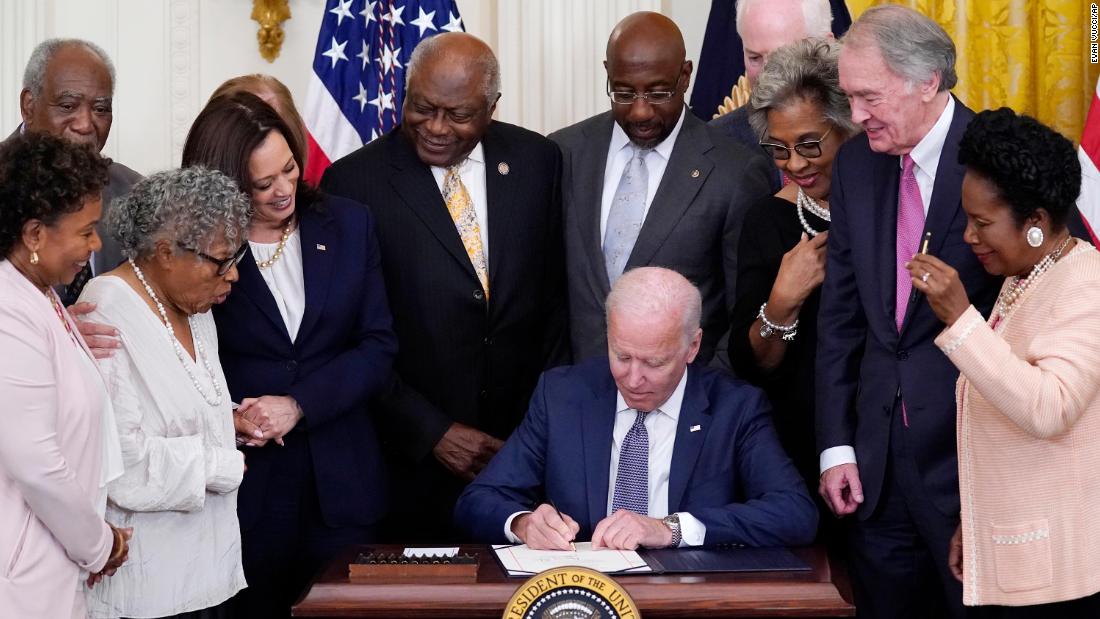Juneteenth bill sails through Congress but key legislation targeting racial inequity faces major obstacles
The bill overwhelmingly passed the House on Wednesday after the Senate unanimously passed the legislation on Tuesday.
But at the same time, key legislation aimed at countering racial inequity and discriminatory policies faces major obstacles on Capitol Hill.
Democrats also face a divide within their ranks and stiff GOP opposition to a sweeping voting and elections bill they have made a signature agenda item and argue is needed to counter state-level Republican efforts to restrict voting access.
Policing legislation
A bipartisan group of lawmakers, led by GOP Sen. Tim Scott of South Carolina, Democratic Sen. Cory Booker of New Jersey and Rep. Karen Bass of California, has been in talks for months in an effort to find consensus between the two parties and strike a deal that could pass in the Senate. The group has reported progress along the way, but a deal still has yet to materialize and it is not clear if the effort will succeed or stall out.
Bipartisan talks have recently been hung up on a key issue: Whether Congress should include new standards for when officers can be charged with crimes.
Democrats have proposed adding new crimes for which officers can be charged, something they argue will increase officer accountability. Scott and Republicans remain steadfast that any change to Section 242 — the standard for criminally prosecuting police officers — is a red line, so any addition of new crimes would have to exist outside of that provision.
Scott said on Thursday that he is open to “continuing the conversation” about adding specific additional crimes outside excessive force for which police officers can be charged, a new development in the ongoing negotiations. Sen. Lindsey Graham, the other South Carolina Republican, said this week they were open to adding crimes like sexual assault.
“I think there is an important consideration that needs to be had about improving the confidence that the communities have to law enforcement’s response and when you see areas that are easily identifiable, should you solve those issues, the answer is you should,” Scott told CNN.
Despite the issues negotiators still must resolve, the lawmakers have sounded optimistic about the prospect that they will get a deal sometime this month.
“I’m still optimistic this is the month that it has to happen,” Scott said.
“I do still think we can wrap things up this month,” Bass said. “And if we have to go into July a little bit, we go into July, but there’s no reason for this to last until the August recess.”
Voting legislation
Efforts by Democrats to enact voting overhaul legislation face multiple hurdles in Congress, specifically in the Senate.
President Joe Biden has urged Democrats to pass the For the People Act and the John Lewis Voting Rights Advancement Act to protect voting access and roll back discriminatory moves against minority voters.
But Democrats do not have the 60 votes necessary to pass either piece of legislation in the Senate, the threshold needed to overcome a legislative filibuster.
Republican senators have widely panned the For the People Act, a sweeping bill that Democrats say will expand voting access and counter efforts to restrict the right to vote at the state level. Republicans, on the other hand, call the legislation a partisan power grab and a federal overreach into state voting and election systems.
“What Sen. Manchin is putting forward are some basic building blocks that we need to ensure that democracy is accessible, no matter your geography,” Abrams, a Democrat and strong advocate for voting rights, said on CNN’s “New Day.”
A test vote on the voting bill is expected to take place next Tuesday, and Democrats are scrambling to try to get Manchin’s support before then so that they can put up a unified front against Republican opposition to the measure. It’s not yet clear if that will happen, however.
The vote would be to break a filibuster to open debate and would require the support of 60 senators, which it does not currently have.
But even if Manchin were to back the legislation, it would still likely lack the GOP support to pass in the Senate.
CNN’s Ted Barrett, Manu Raju, Annie Grayer, Chandelis Duster contributed to this report.
![]()


